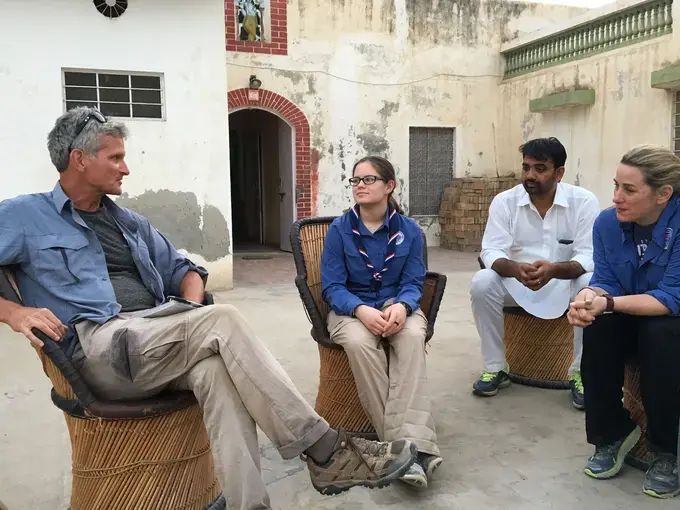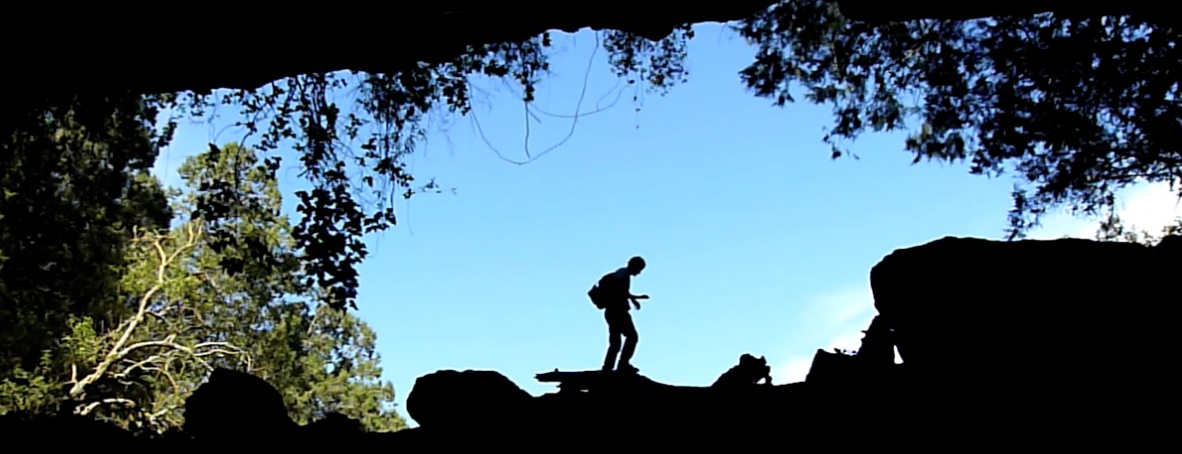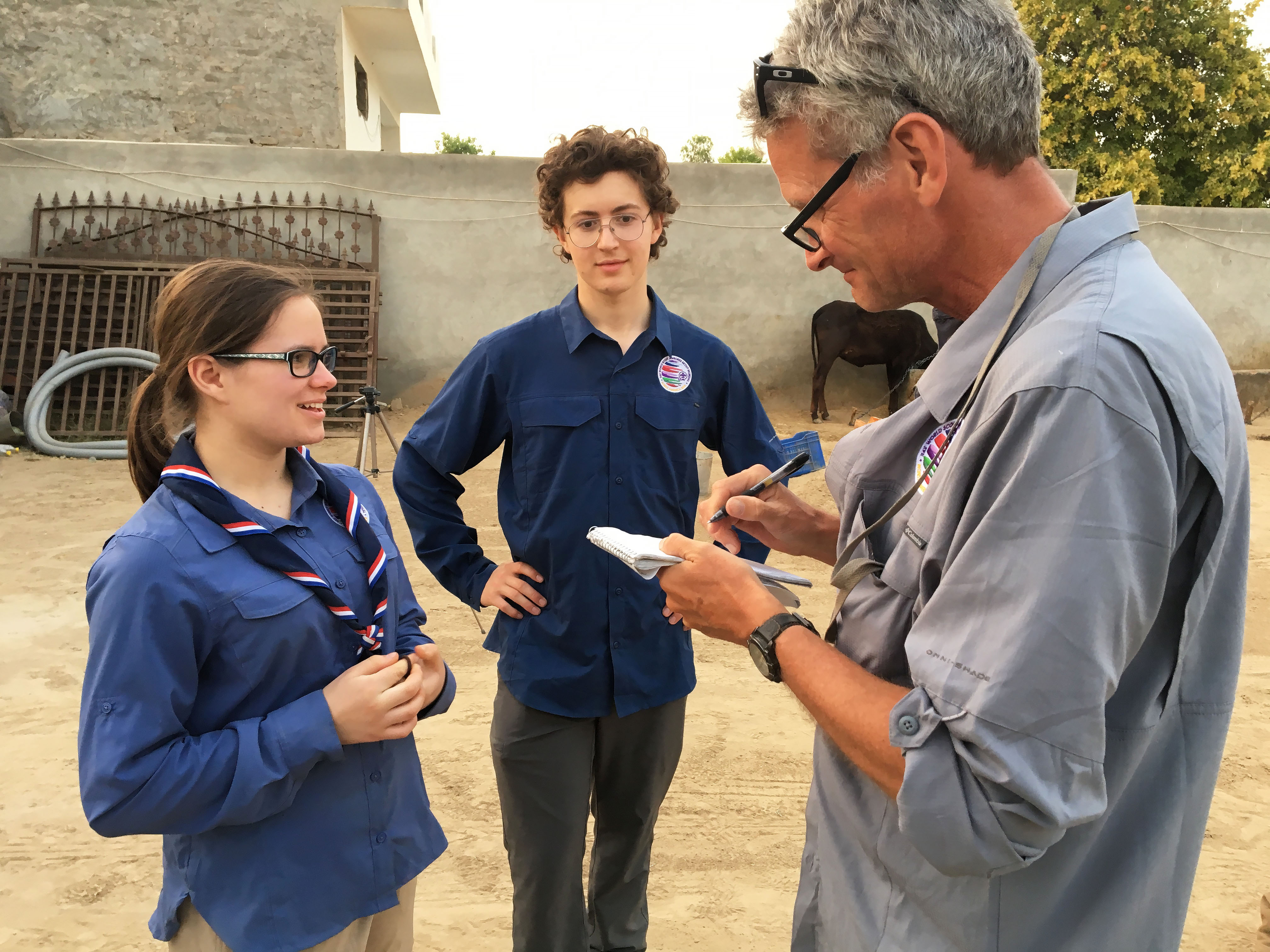
Our first steps land in an inches-deep Punjabi dust so fine it's almost powder. We jump from our van and make contact with this new world like a little caravan of latter-day Neil Armstrongs. Poof, poof, poof. Our boots connect and particles swirl up, mingling with the afternoon light.
Just ahead, Paul Salopek and Arati Kumar-Rao, our guides for the next couple of days, urge us to ditch most of our gear and join them on the trail. No time for formal greetings: it will be at least a two-hour walk before we reach camp, and much of that in the dark. Nobody is quite sure exactly where our campsite is. On either side, wheat fields rustle and shimmer in golden hues. Arati points to a red-naped ibis above. Local kids gather around us, curious about our scouting shirts and strange language. We are led by a donkey with no ears.
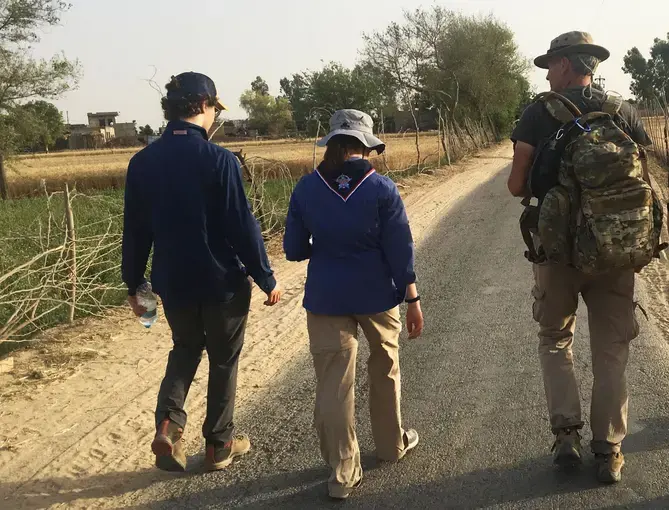
In this way a team of scouts and chaperones hurtles unceremoniously into its small place in the Out of Eden Walk, Salopek's long journey across the planet. The scouts, Miciah Thacker from Cincinnati, Ohio and Chris Sherman from Washington, DC, distinguished themselves last year from among thousands of participants at the National Scout Jamboree and the Philmont Scout Ranch. Through interviews, actions and writing, Miciah and Chris showed judges at the Pulitzer Center and the Boy Scouts of America what the practice of "slow journalism" meant to them, and why they should be selected for this unusual opportunity.
Miciah spent two weeks last July at the National Scout Jamboree in West Virginia, one of some 24,000 from around the world. The Jamboree, held once every four years, offers scouts a seemingly endless array of activities. But rather than focusing on zip lines, skateboarding and BMX racing, Miciah chose to reflect on the in-between periods at the Jamboree, the time when she got to know a scout with cerebral palsy, the cicadas leaping the treetops, and other details that define the experience in ways that many might not notice.
Chris, who trekked at Philmont Scout Ranch last summer, wrote about the way his trek changed his entire perception of the scouting ideal, "not as a series of achievements, but as a way of being." The moments of reflection allowed by slow looking freed his mind to see his life beyond conventional milestones: "I became aware of so much I had overlooked."
And now, Chris and Miciah, along with three adults, Jenn Hancock, Chris Sawyer and me, have crossed continents, global capitals, regional cities, and small villages in a series of inward leaps, zooming in finally on this tiniest of roads in northern India. It is an almost absurdly random spot in the world. The most unlikely of meeting points, yet somehow as likely as any other on the Out of Eden Walk trail. From the moment we join the Walk, we become part of its hyper-present slow-motion flow. We are here now, and we're coming from back there, behind, and we're headed just up there, over the horizon. For now, we exist in that simple state.
Chris and Miciah listen intently as Paul gives us a sense of the place. The gorgeous wheat fields belie the land's tortured history. Even out here, far from any city, people are everywhere. Driving huge combines and cargo trucks overstuffed with the harvest, building things up, tearing other things down. Virtually every scrap of field has long since been claimed and fenced. The Punjab is over-farmed, segmented, degraded. Geckos no larger than your pinkie finger are poached. Under cover of night, soil is stolen.
The best life out here seems to belong to the millions of mature bovines who have their run of the place. No longer of any use to dairy farmers and illegal to slaughter, elderly cows and bulls wander aimlessly, consuming what they will. Razor-wire fences are all a farmer can do to protect his vulnerable crops from these holy pests, but in the few conservation areas, like the one we're currently trekking through, such fences are illegal. They are deadly to the indigenous antelopes, the nilgai and the vanishing blackbucks, who need acres to graze and can easily trip or become entangled.

The horizon soon vanishes. Night falls and only the steady flow of passing trucks and flickering lights in roadside homes preserve us from a stygian darkness. Spirits are high and the teenagers are approaching the trip's little hardships and manifold unknowns with a sense of adventure. We assume that someone knows where we are going, though, at least in my case, that assumption weakens as the hours pass.
The dust piles up. In some places, we're knee-deep. We plod on. It must be 9 or 10 PM. Finally, Paul's GPS indicates that we have found the campsite. Or anyway, we're close enough. Our flashlights show nothing to distinguish this area from the ones we've passed through, but it's so dark, who can tell? We drop our gear and sit in a circle. Arati leaves to find our driver, Raju, who has our tents, water, freeze-dried dinners, energy bars, electrolyte tablets, bug spray, and toilet paper. We last saw Raju many hours ago, where we first met up with Paul, a place that I now think of as light years away. I doubt I could retrace our steps if my life depended on it, which is starting to seem like a possibility.
The others, being scouts, are in a familiar element. They think nothing of being exposed under the night sky. Dirt is their friend. They sit cross-legged on a rough blanket, swapping stories and learning about the local ecology from Paul. He has a gift for reading landscapes, seeing historically rooted social and environmental narratives where others might see only a scrubby patch of land. We have not eaten in hours and it's now getting on midnight, but somehow our group is gaining energy rather than losing it.
At about 1AM, our supplies appear from out of nowhere. A miracle! I strap on my headlamp and dig the DEET from out of my backpack. I down a vegan protein bar in two pasty bites. Maybe in the full light of day this camp won't seem so remote after all. Maybe there's a 7-11 just around the corner. I doubt it. The others heat water and mix up their freeze-dried meals, pitch their tents, and pack it in. Paul tells us to be ready to rise at dawn. It will be cool then, and the blackbucks will likely be out foraging.
At one point in the night I step out to relieve myself, shine my headlamp from the tent and see reflected back at me six or eight gleaming green eyes at ground level. A pack of feral dogs has encircled the camp. I decide I can hold it till daybreak.
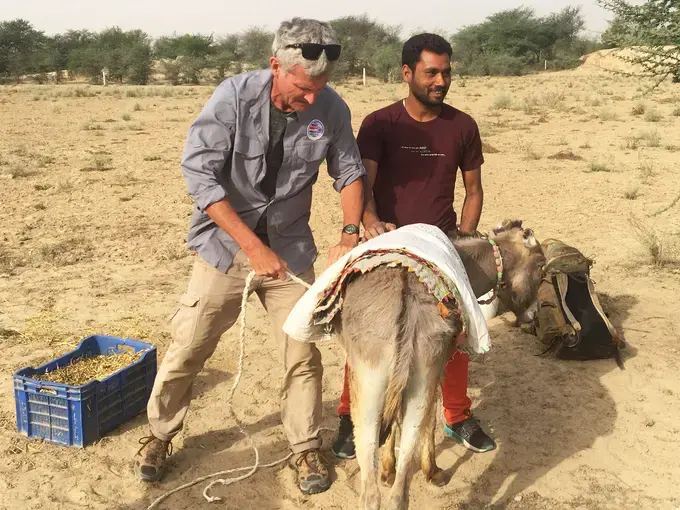
We wake in the early morning to wind gusts that have our tents flapping madly and send our sporks and canteens tumbling. But this is nothing, just a whisper of the furious downbursts that roar across Rajasthan through the Thar desert and beyond, one felling trees, tipping cars, and killing some 140 people in the area just weeks after our trip. The winds die down and we heat water for our instant egg scrambles and coffee. A family of perhaps eight nilgai trot around our camp. Stately animals that can grow to 7 feet head to toe and weigh nearly 700 pounds, the nilgai are nevertheless timid and give our tents a wide berth.
Paul and Arati advise we break camp and make our way to the home of a man named Sudhir Kukna, a farmer who has offered to put us up during the hot part of the day, when temperatures will soar well past 100 degrees. At this time of year the "hot part of the day" runs from sunrise to sunset, but it gets really intense around midday, when, Paul says, "the world is aflame."
For now it's downright balmy, and the morning's walk has nothing of last night's angsty shuffling. I am sunblocked, bug-repelled, hydrated, caffeinated, and bearing the spoils of a spree at my local REI store. I'm ready for all kinds of minor personal disasters that won't happen. Our group keeps a brisk pace, reveling in the landscape of the Punjab, the bread basket of India, now at the peak of the wheat harvest. Paul and Arati tell us to keep on the lookout for the elusive blackbuck.
After a couple of hours we reach a sprawling compound where Sudhir and his extended family tend to their 700-acre wheat and citrus farm. They are members of the Jat ethnic group, an agricultural caste of some six million, mostly in northern India and Pakistan. With Arati translating, Sudhir tells our group the story of his family's migration from the frontier town of Bikaner in Rajasthan, some 160 kilometers south into the Thar desert. Fleeing persecution, they crossed into the southern Punjab and bought land in the nearby village of Bhagsar. Sudhir rarely tells this story. The memories are painful. A family shrine still sits outside Bikaner, but Sudhir cannot visit it.
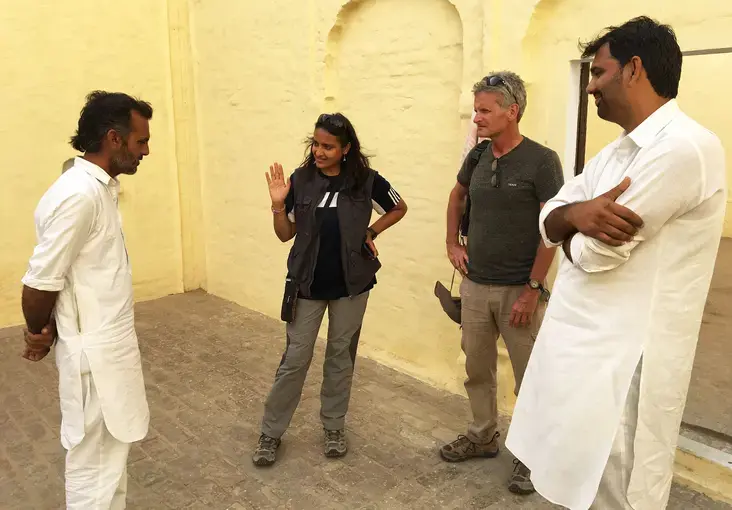
We are served a lunch of Punjabi curries over rice and cottage cheese, garlic naan basted in clarified butter from the family cows, and a savory lassi. It is a feast. We finish what we can, clean up and walk into the village. Paul has arranged for us to speak with members of the Bishnoi sect, Hindu pastoralists who see conservation as a sacred duty. Some fifteen Bishnoi men, representing a group of mostly small farmers in the area, turn up to tell us about their commitment to the sanctity of all life. Though generally on the political margins, and plagued with the illiteracy that often characterizes remote rural populations, the Bishnoi are at the forefront of efforts to keep the blackbuck populations stable. It is not an easy fight, as property rights and cultural traditions are often working against them. Regional government is unresponsive.
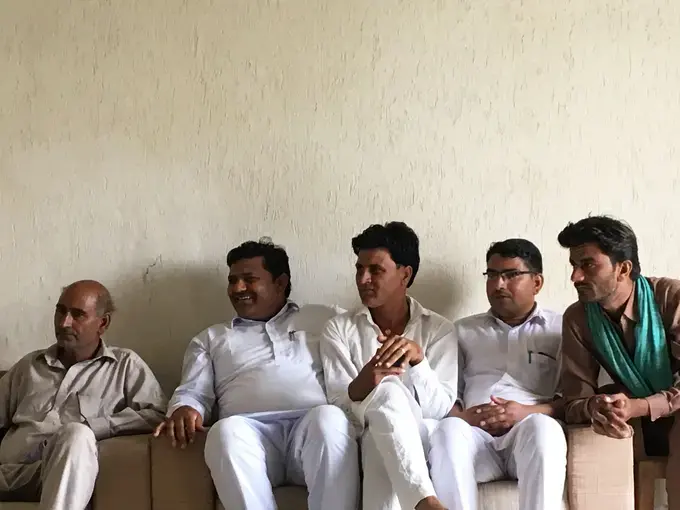
We leave the Bishnoi to tour a centuries-old Muslim home that is being refurbished, and to go camel-shopping back in the village. Paul and Arati will soon be entering the vast Thar desert, and their odd little donkey will not be up to the task of crossing its 77,000 square miles. Merchants bring out a muscular adult dromedary and start rattling off its virtues. A crowd forms to watch us haggle. But the camel is skittish and Paul is not impressed.
It's getting late and with a five-hour drive ahead of us, we walk back to Sudhir's home to gather up our gear and part ways with the Out of Eden Walk. We visitors will head north, to the Sikh holy city of Amritsar. Paul and Arati will walk south into the desert, making their way east across India from there. Sudhir makes us promise to visit again, after his splendid new living quarters are finished. I at least have the luxury of entertaining that happy thought. After five years of wandering, Paul has no doubt found a way graciously to deflect such invitations. He can't make any promises to return. But for now, we're all here together, basking in the warmth of the Kukna family's endless hospitality, sipping tea on wicker chairs in their courtyard as the sun sets. This moment will stay with us.
